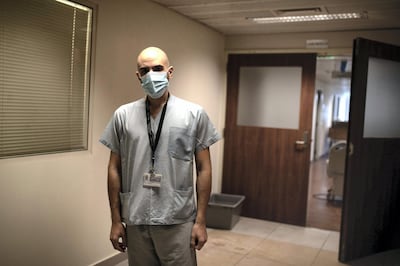Almost a year into the battle against coronavirus, Lebanon’s health care workers are physically, emotionally, and mentally drained.
On a daily basis, they are faced with making almost impossible decisions that go against every oath they have taken.
“We do select patients who go to the ICU, taking age, comorbidities [other illnesses], and the family’s decision into consideration,” said Ghaida El Seddik, a first-year resident of internal medicine at the public Rafik Hariri University Hospital.
For the past few weeks, Lebanon has been setting grim records with more than 4,000 daily cases and total recorded deaths now reaching 1,967.
The crisis was only made worse by record infection rates striking down health care staff.

“It’s a tragedy,” said Dr Charaf Abou Charaf, head of Lebanon’s Order of Physicians. “One that could have been avoided.”
Eleven doctors have died from Covid-19 to date, 25 are currently in the intensive care unit, and at least 200 are in isolation, Dr Abu Charaf said.
“You have to double the numbers for the nursing staff”.
Eased restrictions to salvage the imploding economy during the Christmas and New Year holidays backfired when cautionary measures were not observed by the public.
As a result, the number of Covid-19 patients admitted to the ER more than doubled.
'The worst feeling ever'
Medical experts said the repercussions of Lebanon’s Covid-19 crisis have yet to fully sink in, with predictions of a further surge in cases in the coming weeks.
Hospitals in the country are not equipped to handle the latest influx of patients. All over Lebanon, critical beds are occupied and ventilators are lacking.
As medical centres received more patients and reached capacity, a feeling of helplessness crept over healthcare workers who lacked basic resources to support the incoming patients.
“It’s the worst feeling ever,” said Sami Kais, medical intern at the ER in Hotel Dieu de France east of Beirut. “It goes against the values of our field.”
“Patients pleaded with us that they don’t want to die on the streets or in front of their kids, and there’s not much we can do,” Mr Kais said.
‘How long are we going to last?’
Nour Kassem, a 28-year-old registered nurse in the Emergency Department at the American University of Beirut Medical Centre, said she went to work every day terrified it would be the day she gets infected.
“My colleagues and I always ask ourselves, how long are we going to last?” said Ms Kassem. “I’m numb. I can no longer be called in to resuscitate a patient, only to watch them pass away. It’s devastating.”
Front-liners are “drowning in despair”, said Nermine Khoury, a registered nurse at the Maritime Hospital in the northern coastal city of Byblos. She has twelve years of work experience under her belt, but the Covid-19 outbreak is like nothing she has seen before.

“The hardest part is watching patients die and thinking: What if this happens to my loved ones? What if they get sick too?”
This paralysing fear has forced front-liners to spend days, weeks, and even months away from their families, making them feel more alone.
Marianne Alwan, a third-year resident in internal medicine, had been away from her family for six months, refusing to sit with them, eat with them, or even say goodbye to her travelling siblings.
It was only after she caught the virus that she built up the courage to be around her family. But she was still worried about its ramifications.
“The uncertainty of the virus has left me living with so much anxiety,” said Ms Alwan. “It’s heartbreaking every time we lose a patient, and it’s terrifying that you never know when a stable patient might crash.”
'We treated patients in cars'
Andre Kozaily, the head of Bouar Public Hospital in Mount Lebanon governorate, described struggling with the shortage of healthcare workers as infected nurses, doctors, and residents had to go off duty.
The understaffed hospital was forced to treat patients in their cars after reaching maximum capacity after the holidays.
"Now we've added beds to our ER rooms, corridors, and security offices to be able to take in more people," Mr Kozaily told The National. "Sometimes a bed would only empty up when a patient dies."
With a population of more than six million, Lebanon recorded a 70 per cent increase in Covid-19 infections during the first week of January alone, according to Agence France-Presse, listing it among the countries facing the highest infection rates in the world.

A study conducted by the Global Health Institute at the American University of Beirut places Lebanon as the worst affected in the Arab world, based on the number of Covid-19 cases per million in the population.
While moral support may show healthcare workers a sense of gratitude, they still need to be paid their dues to keep going.
“Healthcare workers in Lebanon are almost working for free,” said Dr Abou Charaf. “With the crash of the economy and the devaluation of the currency, their salaries are nearly equal to nothing today.”
For health care workers who haven't emigrated, the coronavirus vaccine is their only hope to keep them going.
According to Lebanon’s national committee for the Covid-19 vaccine, health care workers are among the first groups to be inoculated in the face of the pandemic.
"We hope the process will go smooth and fast to vaccinate as many workers as we can," Dr Abou Charaf told The National.
“We’re also calling on the ministry to allow for the import of other vaccines, which are cheaper and easier to store, so we could get to vaccinate the population as soon as possible as well.”
Days ago, Lebanon’s caretaker health minister signed a deal to secure 2.1 million doses of Pfizer-BioNTech’s Covid-19 vaccine.
The vaccines are expected to arrive in batches starting February, the ministry said in a statement.











